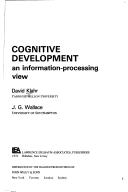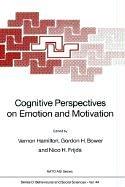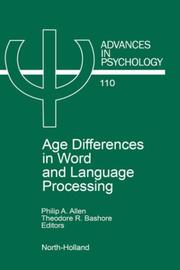| Listing 1 - 10 of 111 | << page >> |
Sort by
|
Book
ISBN: 9781433833861 1433833867 Year: 2023 Publisher: Washington, DC: American Psychological Association,
Abstract | Keywords | Export | Availability | Bookmark
 Loading...
Loading...Choose an application
- Reference Manager
- EndNote
- RefWorks (Direct export to RefWorks)
"This textbook presents a comprehensive and accessible overview of the science of attention, conveying central findings and applications to real-world issues, such as its relationship with technology, learning, and memory"--

ISBN: 9780805822922 0805822925 Year: 2002 Publisher: Mahwah (N.J.): Lawrence Erlbaum,
Abstract | Keywords | Export | Availability | Bookmark
 Loading...
Loading...Choose an application
- Reference Manager
- EndNote
- RefWorks (Direct export to RefWorks)
Human information processing --- Perception --- Human behavior --- Control theory

ISBN: 0470151285 9780470151280 Year: 1976 Publisher: Hillsdale Erlbaum
Abstract | Keywords | Export | Availability | Bookmark
 Loading...
Loading...Choose an application
- Reference Manager
- EndNote
- RefWorks (Direct export to RefWorks)
Book
ISBN: 013139634X 9780131396340 Year: 1979 Publisher: Englewood Cliffs (N.J.): Prentice Hall
Abstract | Keywords | Export | Availability | Bookmark
 Loading...
Loading...Choose an application
- Reference Manager
- EndNote
- RefWorks (Direct export to RefWorks)
Cognitive psychology --- Cognition --- Human information processing --- 159.95*1 --- Information processing, Human --- Bionics --- Information theory in psychology --- Perception --- Psychology --- Cognitieve psychologie --- Cognition. --- Human information processing. --- 159.95*1 Cognitieve psychologie
Book
ISBN: 0050021729 9780050021729 Year: 1970 Volume: 42 Publisher: Edinburgh Oliver and Boyd
Abstract | Keywords | Export | Availability | Bookmark
 Loading...
Loading...Choose an application
- Reference Manager
- EndNote
- RefWorks (Direct export to RefWorks)
Probability theory --- Human information processing --- Choice (Psychology) --- 159.947 --- Psychology --- Information processing, Human --- Bionics --- Information theory in psychology --- Perception --- Psychologie van de wil. Wilskracht --- 159.947 Psychologie van de wil. Wilskracht --- Choice (Psychology). --- Human information processing.
Book
ISBN: 3402044420 9783402044421 Year: 2003 Volume: 79 Publisher: Münster Aschendorff
Abstract | Keywords | Export | Availability | Bookmark
 Loading...
Loading...Choose an application
- Reference Manager
- EndNote
- RefWorks (Direct export to RefWorks)
Neurobiology --- Human information processing --- Cognition --- Singer, W --- Neurosciences --- Information processing, Human --- Bionics --- Information theory in psychology --- Perception --- Psychology --- Singer, W. --- Singer, Wolf --- Cognition. --- Human information processing. --- Neurobiology. --- Singer, W - (Wolf)
Book
ISBN: 9780521518062 9780521739115 9780511977244 9781139091824 1139091824 9781139092845 1139092847 9781139090926 1139090925 0511977247 0521518067 052173911X 1139088599 1107216028 1283193280 9786613193285 1139092332 113909002X 9781139088596 9781107216020 9781283193283 6613193283 9781139092333 Year: 2011 Publisher: Cambridge New York Cambridge University Press
Abstract | Keywords | Export | Availability | Bookmark
 Loading...
Loading...Choose an application
- Reference Manager
- EndNote
- RefWorks (Direct export to RefWorks)
"This volume provides the most comprehensive and up-to-date compendium of theory and research in the field of human intelligence. Each of the 42 chapters is written by world-renowned experts in their respective fields, and, collectively, they cover the full range of topics of contemporary interest in the study of intelligence. The handbook is divided into nine parts: Part I covers intelligence and its measurement; Part II deals with the development of intelligence; Part III discusses intelligence and group differences; Part IV concerns the biology of intelligence; Part V is about intelligence and information processing; Part VI discusses different kinds of intelligence; Part VII covers intelligence and society; Part VIII concerns intelligence in relation to allied constructs; and Part IX is the concluding chapter, which reflects on where the field is currently and where it still needs to go"--
Intellect --- Human information processing --- Intellect. --- Human information processing. --- Information processing, Human --- Bionics --- Information theory in psychology --- Perception --- Human intelligence --- Intelligence --- Mind --- Ability --- Psychology --- Thought and thinking --- Health Sciences --- Psychiatry & Psychology
Book
ISBN: 0805819037 9780805819038 Year: 1995 Publisher: Hillsdale, N.J. : L. Erlbaum,
Abstract | Keywords | Export | Availability | Bookmark
 Loading...
Loading...Choose an application
- Reference Manager
- EndNote
- RefWorks (Direct export to RefWorks)
Psycholinguistics --- Human information processing --- Reading, Psychology of --- Information, Traitement de l', chez l'homme --- Psycholinguistique --- Lecture --- Psychologie

ISBN: 9024736943 9401077568 9400927924 9789024736942 Year: 1988 Volume: 44 Publisher: Dordrecht: Kluwer,
Abstract | Keywords | Export | Availability | Bookmark
 Loading...
Loading...Choose an application
- Reference Manager
- EndNote
- RefWorks (Direct export to RefWorks)
Emotions --- Motivation (Psychology) --- Cognition --- Human information processing --- Congresses --- Cognition. --- Emotions. --- Mental Processes. --- Motivation. --- -Emotions --- -Human information processing --- -Motivation (Psychology) --- -Information processing, Human --- Bionics --- Information theory in psychology --- Perception --- Feelings --- Human emotions --- Passions --- Psychology --- Affect (Psychology) --- Affective neuroscience --- Apathy --- Pathognomy --- Disincentives --- Incentives --- Disincentive --- Incentive --- Drive --- Human Information Processing --- Information Processing, Human --- Regret --- Emotion --- Feeling --- Regrets --- Cognitive Function --- Cognitions --- Cognitive Functions --- Function, Cognitive --- Functions, Cognitive --- Congresses. --- -Congresses --- Mental Processes --- Motivation --- Expectations --- Expectation --- Motivations --- Emotions - Congresses --- Motivation (Psychology) - Congresses --- Cognition - Congresses --- Human information processing - Congresses

ISBN: 9780444817662 0444817662 9780080526867 0080526861 9786611186821 1281186821 Year: 1995 Volume: 110 Publisher: Amsterdam New York Elsevier
Abstract | Keywords | Export | Availability | Bookmark
 Loading...
Loading...Choose an application
- Reference Manager
- EndNote
- RefWorks (Direct export to RefWorks)
Component cognitive processes have played a critical role in the development of experimental aging research and theory in psychology as attested by articles published on this theme. However, in the last five to ten years, there has been a substantial increase in the number of articles attempting to isolate a single factor (or small subset of factors) responsible for age differences in information processing. This view of aging is frequently termed the complexity model of the generalized slowing model, the primary assumption being that age differences in cognition are due simply to a relatively
Cognition --- Human information processing --- Psycholinguistics --- Age factors --- Psycholinguistics. --- Language, Psychology of --- Language and languages --- Psychology of language --- Speech --- Linguistics --- Psychology --- Thought and thinking --- Age factors in human information processing --- Aging --- Age factors in cognition --- Ability, Influence of age on --- Age factors. --- Psychological aspects --- Cognition - Age factors --- Human information processing - Age factors
| Listing 1 - 10 of 111 | << page >> |
Sort by
|

 Search
Search Feedback
Feedback About UniCat
About UniCat  Help
Help News
News